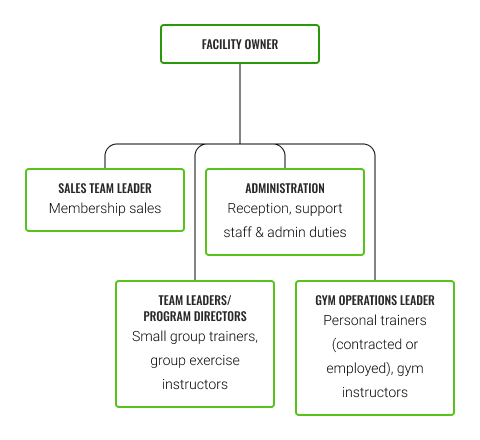In this topic, we focus on the different types of business set-ups available to you in your new career. You will learn:
- Career opportunities
- The nature of a self-employed trainer
- The basis of an independent contractor
- The role of an employee
- Access to essential information regarding business set up.
Terminology and vocabulary reference guide
As an allied health professional, you need to be familiar with terms associated with basic exercise principles and use the terms correctly (and confidently) with clients, your colleagues, and other allied health professionals. You will be introduced to many terms and definitions. Add any unfamiliar terms to your own vocabulary reference guide.
Activities
There are practical activities in the topic. These are not part of your assessment but will provide practical experience that will help you in your work and help you prepare for your formal assessment.

Within the world of exercise and health and fitness, job opportunities are wide and diverse. These can range from being held on a part-time or full-time basis and include roles such as:
- Group exercise
- Sales
- Personal trainer
- Exercise facility manager
- Bootcamp instructor
- Small business ownership… and more.
Note that these roles are mutually exclusive, many people in the industry hold more than one role, these are just a few ideas to whet the appetite!

Your qualifications are just the beginning of a very exciting career!
Interacting on a daily basis with customers to guide them down the path to regular exercise and better health is enormously rewarding. You get back a huge amount in terms of personal fulfilment and satisfaction.Kris Tynan
When taking your first steps in the fitness world, it is important to think about what role and what structure of role you may wish to begin in, do not worry, this will likely change several times throughout your career, this is what makes the world of health and fitness so diverse and exciting. Let us begin with having a look at the different types of business set up you may wish to consider.
This type of business set up relates to a personal trainer running their own business within another exercise facility, this could be a large facility, or a smaller studio type set up. This is a different type of set up compared to an independent contractor. Unlike an independent contractor, a self-employed personal trainer would typically have a licensed contract-based agreement with the facility which would require the trainer to pay a weekly (fortnightly or monthly) fee or a percentage of their session fees to the facility. This can be seen as a form of “rent” in order for using their premises and equipment but most importantly, for having access to their client base, relieving you from having to put in the leg work to find your own clients. Some facilities can also offer in house training for trainers from marketing tips to sales and client management as well as each trainer sharing their knowledge, supporting your growth in many ways!

An independent contractor would typically run their own business out with an arrangement with another establishment, either mobile, in their own home, in client’s home, outdoors or in a small studio setting. Setting up your business as an independent contractor would see you having the responsibility of setting your business up and having full control. You would remove the requirement to pay “rent” however you would be responsible for:
- Business legalities such as obtaining your own ABN, insurance, Health and Safety set up and policies and more
- Set up of finance trackers and taxation documents and processing
- Marketing – procedures and associated costs
- Equipment – purchasing and maintenance
- Client sales
- All associated business costs.
At the beginning of your career, excitement aside, it would be sensible to first start with weighing up the initial set-up costs before jumping into a financial commitment of setting up your own business.
As an employee, you would work for a fitness establishment. You may have other duties within this role such as supporting and consulting with existing gym members, performing exercise consultant sessions and performing activities to support the gym day to day operations. On occasion, this type of arrangement can see personal training sessions being conducted out with your “employed hours” depending on the nature of your employment, where the gym would charge the client an additional fee for personal training services on top of their membership fees with the trainer receiving a portion of this fee in return for their services, on top of their hourly rate of employment. This type of set up can be advantageous to a new personal trainer who is perhaps unsure as to how they wish to kick start their career as they have exposure to gym operations, additional tasks which can be performed in order to maintain daily running activities of a business and also having exposure to clients which are available to be converted into long-term clients.
REPs have a wealth of information to support the exercise professional in every aspect of their career. The information here is just the tip of the iceberg to get you started. Take the time to read through an extremely useful document REPs have compiled which guides you through every aspect of Working in the New Zealand Exercise Industry.
In this topic, we focused on the different types of business set-ups available to you in your new career. You learnt:
- Career opportunities
- The nature of a self-employed trainer
- The basis of an independent contractor
- The role of an employee
- Access to essential information regarding business set up.

